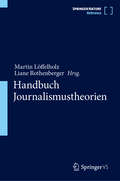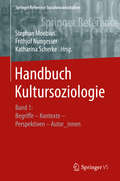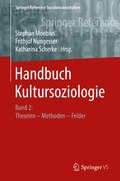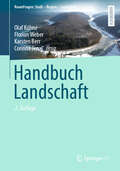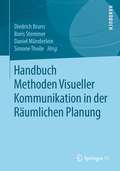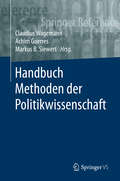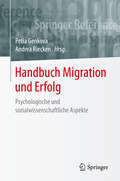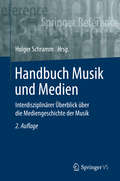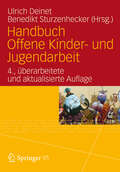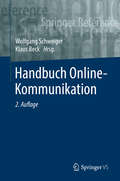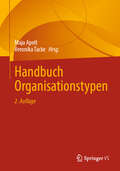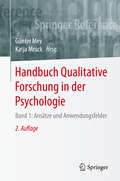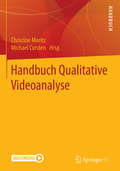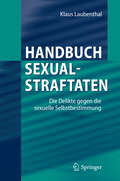- Table View
- List View
Handbuch Intersektionalitätsforschung
by Boka En Katharina JäntschiDas Thema Intersektionalität wird zunehmend in unterschiedlichen Feldern und mit Blick auf verschiedene theoretische wie methodisch-methodologische Ansätze diskutiert. Das Handbuch bietet einen differenzierten Überblick über diese internationalen wie interdisziplinären Diskussionen und öffnet den Blick für weitere Forschungsperspektiven.
Handbuch Journalismustheorien
by Martin Löffelholz Liane RothenbergerDie aktualisierte, neu strukturierte und um 19 Originalbeiträge ergänzte Neuauflage des Handbuchs Journalismustheorien liefert einen systematischen und detaillierten Überblick über die theoretischen Ansätze der Journalismusforschung. Zehn thematische Abschnitte ermöglichen schnelle Einstiege in die jeweiligen Theorienkomplexe und schaffen eine verständliche Orientierung über die Grundlagen, Entwicklungsstränge, Konzepte und Problemfelder der Journalismustheorien sowie darüber hinaus zu theoretischen Ansätzen zu Interrelationen des Journalismus mit Bereichen wie Kultur, Politik, Religion, Sport, Wirtschaft oder Wissenschaft. Für Studierende und Forschende der Journalistik, der Kommunikationswissenschaft und angrenzender Disziplinen bildet das Handbuch ein Standardwerk zum Verständnis des komplexen wissenschaftlichen Diskurses über die theoretischen Ansätze der Journalismusforschung.
Handbuch Kindheits- und Jugendforschung
by Cathleen Grunert Heinz-Hermann Krüger Katja LudwigDas Handbuch dokumentiert den aktuellen Diskussionsstand in der erziehungs- und sozialwissenschaftlichen Kindheits- und Jugendforschung. Für die vorliegende dritte Auflage wurden zwei Drittel der Beiträge neu verfasst und elf weitere Artikel ergänzt, um auf die Weise der inhaltlichen Ausdifferenzierung und Weiterentwicklung der Felder und Kernthemen in der Kindheits- und Jugendforschung gerecht werden zu können.
Handbuch Kindheits- und Jugendsoziologie (Springer Reference Sozialwissenschaften Ser.)
by Andreas Lange Herwig Reiter Sabina Schutter Christine SteinerIm Handbuch werden die wichtigsten gesellschaftlichen Bedingungen und Entwicklungen des Aufwachsens und Erwachsenwerdens von Kinder und Jugendlichen dargestellt. Neben den theoretischen Implikationen des Verständnisses von Kindheit und Jugend werden auch konkrete Forschungsfelder und methodische Herangehensweisen an kindheits- und jugendsoziologische Themen vorgestellt.
Handbuch Kultursoziologie: Band 1: Begriffe – Kontexte – Perspektiven – Autor_innen (Springer Reference Sozialwissenschaften)
by Stephan Moebius Frithjof Nungesser Katharina ScherkeDie Vielfalt kultursoziologischer Ansätze, Diskurse, Arbeitsfelder und Methoden wird in diesem Handbuch kompakt dargestellt. Geboten wird damit die Möglichkeit zur Orientierung innerhalb des heterogenen Feldes der Kultursoziologie. Unterschiedliche Positionen und das mit ihnen jeweils verbundene Verständnis von ‚Kultur‘ werden sichtbar gemacht und die Leser_innen zur weiterführenden Auseinandersetzung mit diesem Forschungsfeld eingeladen.Band 1 des Handbuchs widmet sich dem Begriff der Kultur, der Kontextualisierung des Themenfeldes ‚Kultursoziologie‘ im interdisziplinären Umfeld, seiner Entwicklung und gegenwärtigen Ausformung in unterschiedlichen Weltregionen sowie zentralen kultursoziologischen Autor_innen.
Handbuch Kultursoziologie: Band 2: Theorien – Methoden – Felder (Springer Reference Sozialwissenschaften)
by Stephan Moebius Frithjof Nungesser Katharina ScherkeDie Vielfalt kultursoziologischer Ansätze, Diskurse, Arbeitsfelder und Methoden wird in diesem Handbuch kompakt dargestellt. Geboten wird damit die Möglichkeit zur Orientierung innerhalb des heterogenen Feldes der Kultursoziologie. Unterschiedliche Positionen und das mit ihnen jeweils verbundene Verständnis von ‚Kultur‘ werden sichtbar gemacht und die Leser_innen zur weiterführenden Auseinandersetzung mit diesem Forschungsfeld eingeladen.Band 2 gibt Einblick in theoretische und methodische Ansätze der Kultursoziologie und präsentiert den derzeitigen Stand kultursoziologischer Forschung zu ausgewählten Gegenstandsbereichen.
Handbuch Körpersoziologie 1: Grundbegriffe und theoretische Perspektiven
by Robert Gugutzer Gabriele Klein Michael MeuserDas Handbuch Körpersoziologie verfolgt das Ziel, den grundlegenden Stellenwert des Körpers für soziologisches Denken zu veranschaulichen. Die Körpersoziologie begreift den Körper als bedeutsam für subjektiv sinnhaftes Handeln sowie als eine soziale Tatsache, die hilft, Soziales zu verstehen und zu erklären. Der Körper ist Produzent und Effekt des Sozialen, er ist gesellschaftliches und kulturelles Symbol wie auch Agent, Medium und Instrument sozialen Handelns. Die Körpersoziologie analysiert, wie soziale Strukturen sich in den Körper einschreiben, soziale Ordnung in körperlichen Handlungen und Interaktionen hergestellt und sozialer Wandel durch körperliche Empfindungen motiviert sowie durch körperliche Aktionen gestaltet wird. Körpersoziologie ist in diesem Sinne als verkörperte Soziologie aufzufassen. Das zweibändige Handbuch Körpersoziologie dokumentiert das breite Spektrum an körpersoziologischen Perspektiven und Ansätzen sowie den aktuellen Status Quo der Körpersoziologie. Band 1 präsentiert eine Übersicht zentraler körpersoziologischer Grundbegriffe sowie die Perspektiven einer Vielzahl soziologischer Theorien auf den Körper.
Handbuch Körpersoziologie 2: Forschungsfelder und methodische Zugänge
by Robert Gugutzer Gabriele Klein Michael MeuserDas Handbuch Körpersoziologie verfolgt das Ziel, den grundlegenden Stellenwert des Körpers für soziologisches Denken zu veranschaulichen. Die Körpersoziologie begreift den Körper als bedeutsam für subjektiv sinnhaftes Handeln sowie als eine soziale Tatsache, die hilft, Soziales zu verstehen und zu erklären. Der Körper ist Produzent und Effekt des Sozialen, er ist gesellschaftliches und kulturelles Symbol wie auch Agent, Medium und Instrument sozialen Handelns. Die Körpersoziologie analysiert, wie soziale Strukturen sich in den Körper einschreiben, soziale Ordnung in körperlichen Handlungen und Interaktionen hergestellt und sozialer Wandel durch körperliche Empfindungen motiviert sowie durch körperliche Aktionen gestaltet wird. Körpersoziologie ist in diesem Sinne als verkörperte Soziologie aufzufassen. Das zweibändige Handbuch Körpersoziologie dokumentiert das breite Spektrum an körpersoziologischen Perspektiven und Ansätzen sowie den aktuellen Status Quo der Körpersoziologie. Band 2 versammelt Beiträge zu soziologischen Forschungsfeldern und methodischen Zugänge und belegt damit die soziologische Relevanz des Körpers unter erkenntnis- und sozialtheoretischen, methodologischen und methodischen Gesichtspunkten.
Handbuch Landschaft (RaumFragen: Stadt – Region – Landschaft)
by Olaf Kühne Corinna Jenal Florian Weber Karsten BerrDieses Handbuch präsentiert unterschiedliche Perspektiven auf Landschaft und zeigt die Disziplinen mit ihren Landschaftsverständnissen auf. Ziel ist es, einen Überblick über den aktuellen Stand der Landschaftsforschung zu geben und gleichzeitig die Zukunft der Landschaftsforschung zu beleuchten. Die Autor*innen sind Expert*innen auf ihren Gebieten und im deutschen Sprachraum einschlägig bekannt.
Handbuch Medien und Geschlecht: Perspektiven und Befunde der feministischen Kommunikations- und Medienforschung
by Brigitte Hipfl Johanna Dorer Brigitte Geiger Viktorija RatkovićDer Band bietet einen systematischen Überblick über die Grundlagen, Theorien und empirischen Befunde der feministischen Kommunikations- und Medienwissenschaft. Die Beiträge behandeln die Entwicklungen und den aktuellen Stand der gesamten Breite der kommunikationswissenschaftlichen Geschlechterforschung: Informations- und Unterhaltungsangebote der Medien, Fernseh- und Filmgenres, Social Media, Journalismus, Werbung, Öffentlichkeitsarbeit, Medienpolitik, Medienpädagogik, Medienpsychologie und Medienethik aus Geschlechterperspektive werden ebenso systematisch dargestellt wie die Themen der Frauenbewegung, Gewalt, Körper- und Sexualitätsdiskurse in Medien.
Handbuch Methoden Visueller Kommunikation in der Räumlichen Planung
by Diedrich Bruns Simone Theile Boris Stemmer Daniel MünderleinUm den aktuellen Stand des Wissens und der Anwendung von Methoden visueller Kommunikation aus unterschiedlichen Blickwinkeln zu beleuchten, steuern Autoren aus Wissenschaft und Praxis Beiträge zu diesem Sammelband bei. Sie arbeiten dabei aktuelle Herausforderungen in Bezug auf die visuelle Kommunikation und dazu einschlägige Methoden heraus, um entsprechende Zukunftsperspektiven der räumlichen Planung und insbesondere der Landschaftsplanung bzw. Landschaftsarchitektur aufzuzeigen. Ein solcher Überblick über die visuellen Methoden in der räumlichen Planung ist bisher einzigartig. Neben den eher traditionellen Methoden wie z.B. Modellen und Zeichnungen liegt ein Schwerpunkt in der Betrachtung des Umbruchs der Medienlandschaft, der auch der räumlichen Planung völlig neue Möglichkeiten der Kommunikation eröffnet. So wird die visuelle Kommunikation der Disziplin auch verstärkt Gegenstand einer eigenständigen Forschung, die sich vielfach auf Methoden angrenzender Disziplinen stützt und damit interdisziplinär agiert.
Handbuch Methoden der Politikwissenschaft (Springer Reference Sozialwissenschaften Ser.)
by Claudius Wagemann Markus B. Siewert Achim GoerresDieses Handbuch beinhaltet Beiträge zu Methodenforschung und -anwendung in der Politikwissenschaft, die von führenden Expertinnen und Experten im deutschsprachigen und internationalen Raum verfasst sind. Erstens wird dargestellt, welcher Erkenntnisgewinn mit der jeweiligen Methode möglich ist. Zweitens werden Grundprinzipien der jeweiligen Anwendung erläutert und der Leserschaft ein Einstieg in die Funktionsweise der Methode ermöglicht. Drittens befähigen die Beiträge, mit den beschriebenen Methoden und Techniken verfasste Veröffentlichungen kritisch zu lesen, die Vorgehensweise sowie Qualität der Methodenanwendung zu beurteilen und die Validität der erzielten Ergebnisse einzuschätzen. Und viertens skizzieren die Beiträge wichtige Anwendungsfelder der Methoden anhand von Beispielen politikwissenschaftlicher Veröffentlichungen.
Handbuch Migration und Erfolg: Psychologische und sozialwissenschaftliche Aspekte (Springer Reference Psychologie Ser.)
by Petia Genkova Andrea RieckenDeutschland ist ein Einwanderungsland und die wissenschaftliche Beschäftigung mit Migrations- und Integrationsprozessen wird für ein erfolgreiches Zusammenleben in dieser Gesellschaft immer wichtiger. In diesem Handbuch werden Migration und Erfolg unter psychologischen und sozialwissenschaftlichen Fragestellungen untersucht. In der Migrationsforschung ist diese Perspektive deutlich stärker zu entwickeln, denn oft dominieren Problembeschreibungen den wissenschaftlichen Migrationsdiskurs. Insbesondere die Psychologie beschäftigt sich noch zu wenig mit dem Thema Migration und noch seltener mit erfolgreichen Migrationsbiografien. Die vorgestellten Perspektiven auf Migration, Migrationsverläufe und die Migrationsgesellschaft analysieren deshalb die mit der Migration verbundenen Chancen und Erfolge. Diskutiert wird u.a., was unter Erfolg zu verstehen ist, welche Faktoren ihn beeinflussen und worin er für den Einzelnen, die Gruppe oder die Gesellschaft liegt.
Handbuch Migrationssoziologie
by Antje Röder Dariuš ZifonunDas Handbuch eröffnet einen umfassenden Überblick zum Stand der Forschung in der Migrationssoziologie. Es bietet eine Übersicht über die verschiedenen theoretischen und methodischen Zugänge und entfaltet in den weiteren Abschnitten die migrationssoziologisch relevanten Felder.
Handbuch Musik und Medien: Interdisziplinärer Überblick über die Mediengeschichte der Musik (Springer Reference Sozialwissenschaften Ser.)
by Holger SchrammDie Geschichte der Musik ist ohne die Mediengeschichte der Musik nicht denkbar, denn Konservierung und Reproduktion von Musik war stets auf Medien angewiesen. Musik spielt heutzutage in allen Medien – ob Tonträger, Radio, Film, Fernsehen, Zeitschriften oder Onlinemedien – eine große Rolle. Das Handbuch dokumentiert die Entwicklungsgeschichte der Musik in den verschiedenen Medien und nimmt neben der historischen auch technische, ökonomische, ästhetische, kulturelle und gesellschaftliche Perspektiven ein. Namhafte Autorinnen und Autoren aus der Medien-, Kommunikations-, Musik- und Kulturwissenschaft gewährleisten den interdisziplinären Charakter und Anspruch des Handbuchs.
Handbuch Märchen
by Stefan Neuhaus Lothar BluhmMärchen stellen eine der bekanntesten Literatur- und Erzählformen dar. Ihre Typologie, Geschichte und ihre vielfältigen literarischen und weiteren medialen Erscheinungsformen sind Gegenstand einer oft schon unüberschaubaren Forschung. Das Handbuch bietet einen Überblick über das weite Feld der Märchen und ihre literarischen Repräsentationen. Näher vorgestellt werden deutschsprachige Autor*innen von Christoph Martin Wieland bis Karen Duve, dazu kommen Überblicksdarstellungen zu einzelnen Themen und Forschungsdiskursen. Das Handbuch will die Vielgestaltigkeit der Gattung offenlegen sowie in die wissenschaftlichen Diskussionen um das Märchen einführen.
Handbuch Offene Kinder- und Jugendarbeit
by Ulrich Deinet Benedikt SturzenheckerDie aktuelle, vierte Auflage des Handbuches Offenen Kinder- und Jugendarbeit hat ein ganz neues Konzept bekommen und viele Inhalte wurden erstmalig aufgenommen. Das Handbuch ist seit vielen Jahren das Schlüsselwerk zu dem großen Arbeitsfeld der Offenen Kinder- und Jugendarbeit. Das Handbuch schließt relevantes Wissen auf und regt Reflexion an. Es unterstützt Fachkräfte der Praxis bei der Klärung ihres Selbstverständnisses, ihrer Ziele und Arbeitsweisen. Das Handbuch hilft pädagogisches Handeln im komplexen Feld der Offenen Kinder- und Jugendarbeit professionell zu gestalten, es nach außen zu begründen und wo nötig zu verteidigen. Die heutigen Herausforderungen an eine fachlich qualifizierte Jugendarbeit werden aufgegriffen und kompetent beantwortet. Die Autorinnen und Autoren aus Wissenschaft und Praxis haben langjährige Expertise für das Handlungsfeld. Sie zeigen, dass Offene Kinder- und Jugendarbeit ein wichtiger Bildungsort für Kinder und Jugendliche ist. Das Handbuch nutzt so den Fachkräften, mit den Kindern und Jugendlichen Selbstbestimmung zu entfalten und gesellschaftliche Mitverantwortung auszuüben.
Handbuch Online-Kommunikation
by Klaus Beck Wolfgang SchweigerDas Handbuch gibt in 23 Beiträgen einschlägiger FachautorInnen einen umfassenden und systematischen Überblick des aktuellen Forschungsstandes kommunikationswissenschaftlicher Online-Forschung. Einführend werden die zentralen Fragestellungen, theoretischen Ansätze und empirischen Befunde dargestellt. Das Themenspektrum reicht von den Grundlagen computervermittelter Kommunikation (interpersonale, Gruppen- und öffentliche Kommunikation), über ökonomische, ethische und politische Fragen wie Regulierung und Kontrolle des Internets, sowie seine Verbreitung, Nutzung und Wirkung. Weitere Beiträge befassen sich mit Öffentlichkeit und Journalismus online, kulturellen und sozialpsychologischen Aspekten, Online-Werbung und -PR, Gesundheitskommunikation, E-Learning und Wissensmanagement sowie Online-Spielen. Ein Überblick über Methoden der Online-Forschung sowie die wichtigsten Datenquellen und Standarduntersuchungen rundet das Werk ab.
Handbuch Organisationstypen
by Maja Apelt Veronika TackeDie Organisationssoziologie ist es gewohnt, ihren Gegenstand anhand eines allgemeinen Begriffs der Organisation zu beschreiben. Zwangsläufig aber hat sie es stets mit besonderen Typen der Organisation zu tun, seien es Unternehmen, Universitäten, Verwaltungen, Kirchen, Parteien, Schulen, Krankenhäuser, Wohlfahrts- oder Protestorganisationen. Auf unterschiedlichen Ebenen der typologischen Generalisierung tragen die Beiträge des Handbuchs das Wissen über eine Vielfalt moderner Organisationen zusammen, ohne dabei grundsätzliche Fragen der einheitlichen Typologiebildung aus dem Blick zu verlieren.
Handbuch Policy-Forschung
by Reimut Zohlnhöfer Georg WenzelburgerDas Handbuch bietet in der 2. aktualisierten und erweiterten Auflage einen Überblick über den aktuellen Stand der Policy-Forschung. Theorie-Beiträge präsentieren die Annahmen, Grundideen, Hauptargumente und Hypothesen der jeweiligen Theorieansätze zur Erklärung von Policies und diskutieren die empirische Eignung der Theorien durch einen Überblick über den Forschungsstand. Die Beiträge „Methoden der Policy-Forschung“ stellen Grundzüge, Stärken und Schwächen sowie Anwendungsfelder einschlägiger Methoden dar. Anhand ausgewählter Politikfelder werden Ergebnisse der Policy-Forschung in unterschiedlichen Bereichen der Staatstätigkeit aufgezeigt und Querverbindungen sowohl zu den unterschiedlichen theoretischen Zugängen als auch zu unterschiedlichen Methoden gezogen.
Handbuch Qualitative Forschung in der Psychologie: Band 1: Ansätze und Anwendungsfelder
by Günter Mey Katja MruckQualitative Forschung und ihre Methoden sind ein wichtiger Zugang im Rahmen psychologischer Erkenntnissuche. Während qualitative Herangehensweisen in benachbarten Wissenschaftsfeldern zum Standardrepertoire gehören, ist diese Tradition in der Psychologie über Jahrzehnte vernachlässigt worden. Die Erstauflage aus dem Jahr 2010 hat eine Wende eingeleitet. Die Neuauflage mit 70 Beiträgen erscheint in zwei Bänden und steht für die Etablierung und Weiterentwicklung einer qualitativen Psychologie. In Band I werden zentrale Positionen vorgestellt, die eine theoretische Fundierung für qualitative Forschung in der Psychologie bieten. Im Anschluss wird eine Vielzahl an Anwendungsfeldern und subdisziplinären Arbeitsgebieten behandelt.
Handbuch Qualitative Videoanalyse
by Christine Moritz Michael CorstenDas Handbuch bietet einen breiten und vollständigen Überblick über die derzeit wichtigsten qualitativen Methoden der Videoanalyse und Filmanalyse sowie deren Entwicklungen in den Sozialwissenschaften und schließt somit in einem Fachbereich, der durch hohe Diversität gekennzeichnet ist, eine noch immer bestehende Lücke. Zudem geht der Band forschungspraktisch auf die bestehenden methodischen und methodologischen Herausforderungen ein, differenziert und arbeitet auf diese Weise die bestehenden Anforderungen im Umgang mit dem besonderen Datentypus nachvollziehbar heraus.Videos per App: Laden Sie die Springer Multimedia App kostenlos herunter - Abbildungen im Buch per App mit Handy oder Tablet scannen, um Videos zu streamen.
Handbuch Sexualstraftaten
by Klaus LaubenthalDas Handbuch behandelt umfassend die Delikte gegen die sexuelle Selbstbestimmung, wie sie im 13. Abschnitt des Strafgesetzbuches normiert sind. Der Autor erläutert die Sexualstraftaten unter Berücksichtigung der Rechtsprechung und anhand zahlreicher Fallbeispiele. Das Nachschlagewerk richtet sich an alle, die in der Rechtspflege tätig sind. Es liefert Argumentations- und Entscheidungshilfen, einschlägige Rechtsprechung sowie Literatur können schnell aufgefunden werden.
Handbuch Sicherheitswirtschaft und Öffentlich-Private Sicherheitskooperation (Sicherheit – interdisziplinäre Perspektiven)
by Rolf Stober Sven Eisenmenger Harald OlschokDieses Handbuch behandelt alle aktuellen Praxisfragen der Sicherheitswirtschaft u.a. aus rechtlicher, betriebswirtschaftlicher und technischer Sicht. Im Fokus des Handbuchs stehen zudem Öffentlich-Private Sicherheitskooperationen, also die Beauftragung der Sicherheitswirtschaft mit Sicherheitsdienstleistungen durch die öffentliche Hand (Luftsicherheitsdienste, ÖPNV-Dienste etc.). Das durchgängig interdisziplinäre Handbuch richtet sich an Praktiker*innen der Sicherheitswirtschaft, der Unternehmenssicherheit und der staatlichen Verwaltung, kann aber auch Forschung und Lehre an Hochschulen als zentrales Nachschlagewerk dienen.
Handbuch Sound: Geschichte – Begriffe – Ansätze
by Daniel Morat Hansjakob ZiemerDieses Handbuch bietet einen Überblick über Sound in den Kultur-, Geistes- und Sozialwissenschaften. Ausgehend von der Beobachtung, dass Sound ein soziales und damit auch ein historisches Phänomen ist, greifen die Autorinnen und Autoren die Vielfalt von Sound in unterschiedlichen Erscheinungs- und Darstellungsformen auf und verfolgen ihre Spuren in Geschichte und Gegenwart. Sie skizzieren methodisch-theoretische Zugänge und Begriffe der Soundforschung und gehen auf disziplinäre Perspektiven und Traditionen ebenso ein wie auf einzelne akustische Phänomene. Dabei werden spezifische Räumlichkeiten genauso berücksichtigt wie die medialen und politischen Kontexte, in denen Sound produziert und erfasst, angeeignet und genutzt wird. Das Handbuch gibt damit nicht nur eine breite Übersicht über die aktuelle Diskussion zu Sound, sondern liefert auch vielfältige Anregungen für zukünftige Forschungen.

